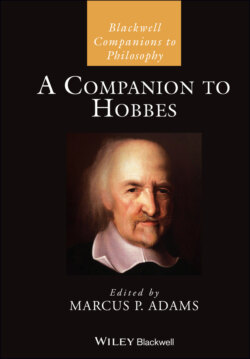Читать книгу A Companion to Hobbes - Группа авторов - Страница 62
5 “A Most Useful Economy”: Hobbes on Linguistic Meaning and Understanding
ОглавлениеR.W. MCINTYRE
Hobbes holds that there is an intimate connection between linguistic meaning and thought. In Leviathan Hobbes defines linguistic understanding in the following way:
When a man upon the hearing of any Speech, hath those thoughts which the words of that Speech, and their connexion, were ordained and constituted to signifie; Then he is said to understand it: Understanding being nothing else, but a conception caused by Speech. And therefore if Speech be peculiar to man (as for ought I know it is,) then is Understanding peculiar to him also.
(Hobbes 2012, 62; 1651, 17)
From passages such as this, it is easy to conclude that signification – the relationship between a linguistic expression and that thought the expression signifies – is Hobbes’s primary semantic notion. Yet, this conclusion does not square well with Hobbes’s definition of a sign:
A Signe, is the Event Antecedent, of the Consequent; and contrarily, the Consequent of the Antecedent, when the like Consequences have been observed before.
(Hobbes 2012, 44; 1651, 10)
As Ian Hacking observes, given this definition of “sign,” it is “very difficult to foist any theory of meaning on to Hobbes” (1975, 20; cf. Abizadeh 2015 and Ott 2003, 13–21). Indeed, since understanding is “conception caused by speech,” it seems that Hobbes is confusing natural meaning and non-natural meaning in Grice’s sense (Grice 1957). Moreover, given that names in speech register thoughts, signify thoughts in communicative acts, and that one understands speech when one “hath those thoughts” names in speech signify by their “connexion,” it sounds as though Hobbes is suggesting a distinctly unattractive “encoding” theory of meaning and “decoding” theory of communication – as if by a kind of mental transduction.
The purpose of this chapter is twofold. First, to provide a general overview of Hobbes’s views on language; second, to argue that Hobbes holds an inchoate, but recognizable, version of an inferential role or functional role semantics. On Hobbes’s theory of language use and linguistic meaning, the meaning of an expression is the functional role of that expression in cognition. Linguistic competency – manifested in the capacity to understand names in speech as signs of thought – is a matter of knowing how to deploy names to recall thoughts, make judgments, and syllogistic inferences.
In the first section, I provide a broad overview of Hobbes’s views on the mind’s natural cognitive powers. In that section, I analyze signification and signs, arguing that signification is a causal relation and not a semantic one, so that the signification of a linguistic expression is not that expression’s linguistic meaning. In the third and fourth sections, I describe Hobbes’s account of the use of names in cognition – names are marks, applied to objects, for the sake of recalling thoughts of those objects. I argue that this use of names is the fundamental one; the communicative use of names in speech to signify thoughts is derivative of this latter, principal use. Finally, I turn back to Hobbes’s account of linguistic understanding. I argue that the understanding of linguistic expressions characteristic of mature, fully language-competent humans is determined by the ability of language-competent humans to deploy names in reasoning. To understand words in speech – to take them as signs of thought – presupposes a grasp of linguistic meaning and this is a matter of knowing how to reason and calculate with names: “For words are wise mens counters, who do but reckon by them” (Hobbes 2012, 58; 1651, 15).
